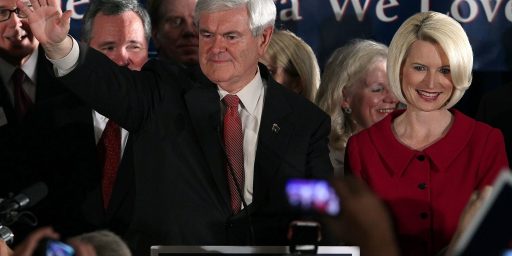Health Care, the GOP Field, and Tribal Politics
How much of public opinion is about tribal political identification and how much is about the actual policies themselves?
Doug Mataconis points out that none other than Newt Gingrich was a supporter of the individual mandate to require everyone to purchase health insurance (and, indeed, a relatively recent one at that). Further, Gingrich supported a general policy proposal that was not all that different that the PPACA that passed Congress (a.k.a., Obamacare). Of course, Gingrich is not the only one of the GOP hopefuls to have supported such ideas in the past. We are, of course, quite aware of a very similar plan in Massachusetts, which was a (if not the) signature policy achievement for then-governor Mitt Romney. Indeed, I have continually tried to point out (for example see this post) that the PPACA was basically the GOP’s alternative to Clinton’s health care proposal in the 1990s and specifically that the individual mandate was once considered the GOP’s solution to universality (with a specific emphasis on personal responsibility).*
Now, however, the individual mandate is cast by Republicans as the height of socialism (if not communism and fascism all rolled into one) and the beginning of a reign of tyranny (or, at least, slavery) the likes of which this country has never seen.** It is a startling contrast, to say the least. And, of course, the rank-and-file of the GOP/conservative movement (especially the Tea Party faction) are very much on board with this characterization. In fact, it seems to me that a lot of people who think that they are opposing the individual mandate on principle are, in fact, opposing it wholly for partisan reasons even if they don’t realize it (because it was proposed and passed by a Democratic president and Democratic Congress and because current Republican leaders are opposed to it, not because of policy reasons, per se). This is not to say that there isn’t also principled opposition, of course. Still, I can easily envision a scenario in which Obamacare was a single-payer system and Mitt Romney arguing how his plan was the conservative option: one that made individuals responsible for their own insurance that used market forces (vouchers and exchanges to drive down price). Of course, part of the reason that this is easy to envision is that that was at least part of the rhetoric of the 1990s.
Quite frankly, I think this underscores much of what is wrong with our politics: that it is often as much about whose side is doing something rather than the value (or not) of what is being done. We have our tribe and that is where we start. Does our tribe like this policy? Does our tribe not like it?
Now, the fact that Romney championed a policy very similar to the PPACA or that Gingrich once supported the individual mandate (or that much of what became the PPACA looks a lot like Heritage Foundation proposals from the 90s) doesn’t mean that any of these policies are good ideas (or bad ones). I am not arguing that conservatives should change their minds because particular politicians once supporter them, but am saying that perhaps, at minimum, it should put some of the more extreme rhetoric into perspective. Further, it strikes me that this situation radically underscores the problem with our tribal political system wherein people act like (and truly think) that they are being principled but, in fact, they are following the cues of their partisan leaders (and reacting not to the ideas, but to who supports them and who opposed them).*** In other words: opposition to the PPACA was as much about the fact that it was proposed by Democrats as anything within the policy itself. And despite the fact the GOP (and the public) had managed to maneuver the Democrats to a position more moderate than its preferred single-payer system, the political choice was made to attack rather than cooperate. And, of course, to go on the attack meant a take-no-prisoners approach (hence the cries of socialism!). This is all a shame, because instead of actually working towards workable policies, we end up casting the debate as a morality play in which our side is good and the other is evil. It is rather hard to accomplish much of substance in such an environment.
Ultimately I simply find it stunning (and have for a while) how a set of policy proposals that were once fairly mainstream in some key conservative circles (for example, see here) have been so thoroughly cast as radical.
Of course, revelations such as those about Newt are not going to lead to reasonable discourse (“oh, gee! you’re right: I thought this was a good idea about 5 years ago..let’s see if we can work to make it work!”). Rather, he will have to explain away how nearly identical proposals were, in fact, not the same at all, and he will have to prove his bona fides to the base which has been told, repeatedly, what the proper tribal response should be. Or, if Gingrich/Romney can’t explain these positions away, it will simply make it easier for candidates without such paper trails to win votes from that base in the 2012 primaries.
And even if all of this doesn’t represent some broad critique of US politics, it is surely a pretty severe critique of Gingrich and Romney, as it would seem that the issue for them isn’t conviction about policy, it is about winning elections (or popularity in terms of selling books and TV appearances—whatever the goal might be at the moment). And even if convictions enter the picture who really knows if they were acting on conviction when they supported these policies or whether they are acting on conviction now. It really isn’t especially impressive no matter how you slice it.***
Perhaps the most interesting question is the degree to which these types of situations are elite driven or mass public driven. That is to say: to what degree do elite statements influence mass opinion and to what degree are elites reacting to existing opinion? No doubt there is a synergy here. However, my hypothesis would be that in large measure the elites, who need to be in opposition to other elites (whether in terms of electoral campaigns, within government, or in mass media) get the ball rolling. Of course, once mass publics react well to such rhetoric, it’s Katy bar the door.
—–
*And hence my post: Obama: Moderate 90s Republican?
**Hyperbole? Perhaps, but not necessarily. Of course, one need not look any further than the comment section of this blog to find claims of communism and budding tyranny. For fascism claims, it is more likely that one needs to consult Glen Beck’s oeuvre.
***BTW, no, I am not suggesting that this a uniquely Republican/conservative phenomenon.
****And, by the way, I have no problem with, and indeed would be refreshed to see, a politician who simply was willing to say that he or she changed their mind on something after giving it serious thought. However, political expediency seems the better explanation here.







As you indicate later in the piece, I think — at least in the case of conservatives’ shifting views on health care — the greater dynamic was “Does the other tribe like it? In that case, it must be terrible.”
It goes back to my favorite Ezra Klein quote:
It’s just as important for people on the right to believe that they are real Americans as it is for them to believe that those on the left are not real Americans. It’s a zero-sum game.
When someone on the left proposes something, it is de facto unAmerican. It must be. If it wasn’t, how would those on the right know that they are the true Americans? They feel that agreeing with the left would be ceding to anti-Americanism. So of course they oppose it reflexively. Rationale comes later, and of course there’s a difference between “rationale” and “rational”.
I think the Republicans sometimes throw up these plans as canards, and then are shocked to see them return as Democratic policy.
But I guess the lesson is the same. If you aren’t serious about a plan, don’t back it.
of course your post is focused on the ACA which is a prima fascie example. but the newtster specifically and republicans generally also supported cap and trade until democrats embraced it as a policy. the debt commision was a republican idea which they ran away from as soon as obama adopted it. the silly folks with tea bags dangling from their tri-cornered hats scream about taxes when obama has in fact cut almost everyones taxes and effective tax rates are at or near an all-time low. so yes, at best it’s about tribalism for them.
an important consideration is that the so-called republican tribe has veered so far to the extreme that they have absolutely no room to operate. as you point out the aca was a resonse to the clinton health care proposal. so when the democrats moved to that position the pseudo-conservatives had to move further to the extreme. now thay have absolutely no idea how to actually deal with health care – except to repeal and don’t replace which hardly qualifies as an idea. to move to a more moderate position would put them in the same boat that the mittster is trying to bail-out as we speak.
now – are democrats guilty as well? logic would say yes: tit-for-tat. but most democrats went along with iraq if only begrudgingly. it was only later when clear evidence of cherry picked and stove piped intelligence began to emerge that there began to be a push-back. enough democrats were against the 2001 and 2003 tax cuts that they had to be passed by reconciliation – and ultimately the left has been proven right on that – those tax cuts are among the biggest drivers of todays debt.
i think there is something to the ezra klein qoute provided by tgchicago.
The tribalism is one-sided. Since the sixties Democrats after all consistently pushed to bring more people into politics — African Americans, women, gays, Hispanics We favor a “tribe” that includes all Americans. Or, a critic might say, a sort of union of individual tribes.
The Republicans have increasingly become the tribe of white people. They’ve made virtually no movement toward including new groups, they’ve instead focused on purity and intellectual conformity.
They require tribalism, as Chicago says above. We don’t have the news channel devoted to enforcing party discipline, or the talk radio apparatchiks doing the same. We have no counterpart to Rush Limbaugh constantly defining and excluding and attacking. On the contrary, the president is almost obsessively inclusive.
The GOP is the party of angry, fearful whites. The Democrats are the party of everyone else — progressive whites, blacks, Hispanics, gays, Asians, the young, It’s the GOP that establishes this tribal politics.
I think if you look at the contempt and condescension show by some “progressives” towards people who are deeply religious or live in rural areas or otherwise don’t fit into the standard Democratic constituencies, it’s not hard to find examples where the tribalism is not one-sided.
If you don’t see that, consider the emotional response that some progressives have to people described as “devout Christian” or “NRA member” or “businessman” or Southern white male”.
Ratufa,
Think before you write. There are many NRA members, devout christians and southern white males on the left and in the Democratic party.
There are no democratic socialists, liberals or anti-gun advocates on the right, or in the Republican party. They’ve spent the last thirty years driving people who disagree out.
There is no equivalency, and Michael is spot on.
ratufa:
To expand n what Ben said, African-Americans and Hispanics are both very reliable Democratic voters and among the most religiously devout groups in the country.
As a kid I took the NRA safety course, fired and owned various guns. I don’t at present because I have kids. I’m not an NRA member, but not categorically hostile to guns, either. If you look at the conflict over guns what you’ll see is the very tribalism we’re talking about. Democrats propose something as simple as outlawing armor-piercing bullets and the right wing freaks out.
Insofar as the rhetoric is concerned, I agree. I was intrigued by Romneycare (though a little relieved it wasn’t being tried in *my* state) and ultimately came down against the PPACA. But I found the criticisms of it to be more than a little overwrought and disingenuous in a way that’s going to come back and haunt them.
It’s part-and-parcel, though, to the politics-as-morality that’s been the case for as long as I have been following politics.
MR’s “tribalism is one sided” post is a great example of how your writing can be self-undermining when the primary message and the secondary message contradict each other.
Because their proposal isn’t to actually banning armor piercing bullets (in the sense that it is normally used of a sabotted round specifically designed to maximize armor penetration). Those are already banned. They want to ban any round capable of penetrating a bullet proof vest, which is basically all rifle rounds.
Steve Kornacki has thoughts on the right and healthcare:
Yup. All he needs to do is convince the base that he’s a “real American”. Any policy details can be glossed over as long as they keep saying Obama’s plan is unAmerican and Romney’s was a patriot’s dream.
Ratufa, I am a businessesman who owns several guns and enjoys target shooting. My wife is a reasonably devout Catholic. Most of the Republicans I know think of me as a liberal. Personally, I tend to distrust such labels, but I would describe myself as a Dean Democrat. Oh yea, I voted for Reagan. Twice…
Try harder…
Uh huh.
Interesting interpretation. Let’s accept it as true. The next step would be the NRA and their friends in Congress working to make the legislation more specific, more targeted.
That happened, right?
I’m guessing not. Because the NRA reflexively attacks all gun legislation. And they threaten to destroy anyone who votes against them, even if the vote is on private ownership of automatic weapons.
See, that’s tribalism.
As I noted before, armor piercing bullets are already banned:
US Code Title 18,921.17.a
What is the point in making the law more specific when the more specific version has already been enacted?
I don’t remember the Republicans opposing a ban on armor piercing ammunition because it’s a God Given Right to own such ammo; but because they thought such a ban was utterly stupid. That is, such a ban wouldn’t prevent criminals from getting the ammo in question, any more than drug control laws have eradicated drugs from the streets.
Ya gots ta luv the Blogosphere: you write a post about Gingrich, health care reform, and political tribalism and a gunfight breaks out 😉
LOL. Really, that one’s hilarious.
The evidence is that drilling in the Gulf of Mexico can resume (according to President Obama’s hand picked committee), but liberals continue to prevent it.
Twenty years of scientific study stands behind opening Yucca Mountain. Liberals continue to prevent it.
Medical studies show that silicone breast implants are safe enough to sell, but liberals prevent the FDA from granting approval.
I continue to find it weird that Professor Taylor finds it “stunning” that given a choice between A and B, politicians will choose A; but the same politicians will choose C if that’s added to the mix.
That is, during the ’90s, the two choices appeared to be HillaryCare and the individual mandate. At that time, many politicians took the individual mandate, not because it was good but because it was less bad than HillaryCare. Twenty years later, it appeared that a third choice was possible (because, after all, President Obama thought an individual mandate was too extreme when he was running for the office) and politicians took that one instead. There’s nothing sinister about this.
@Maz:
I don’t recall using the word “sinister.”
And this is not just a case of A over B over C. It is a case of Gingrich actively arguing for a policy as recently as 2007 and now treating it like it is the worst idea of all time. And while I wound’t call it sinister, I would call it dishonest.
Yeah, but it worked out great for me. I had to bang out a prequel mini-story for a series I’m doing, and this handed me just what I needed. It’s one of the fun things about writing fiction: no interaction is ever completely wasted.
No, you used “stunning,” which is the word I quoted.
I can’t say what Gingrich thinks. I know that Romney wasn’t going to get anything through Massachusetts that wasn’t to the left of the rest of the US; and that Romney couldn’t take the wait and see approach either.
It seems possible that one reason a politician such as Gingrich could have changed positions on an individual mandate would be Massachusetts’ experience running one.
@Max:
You used the word “sinister” in the last word of your comment.
And while I cannot know what Gingrich thinks, I can know what he has written and said. As such, I am unsure of your point.
And, as far as I can tell, he isn’t making that argument. Rather, he appears to be pretending that his previous position never existed.
Are you defending that type of about-face without explanation?
I find that, well, stunning 😉
I see this tribalism as mostly one sided and as a major problem for our country. I think it hit it’s stride around ’94 with Gingrich’s strategy of constant attack and “power words”, growing ever since but maybe I wasn’t paying enough attention earlier. I believe it’s elite driven, if by elite we mean talk show hosts, think tanks and Fox. Hopefully someday conservatives will realize that driving their base insane is not a good idea.
Speaking as a tribe-less independent ;-), I think michael is partially right. The two parties have their constituent tribes, but the mapping is stronger on the Republican side. The Tea Party tribalism was very strong. Whale warriors would love to reach those heights.
Repubs like to cite G8 demonstrations, but those demonstrations were complete confusion, vegans protesting alongside native whale hunters, each pursuing incompatible goals.
I made a fairly modest claim about the behavior exhibited by “some progressives”. Note the use of “some”. That some other progressives (including my esteemed fellow commentators) don’t exhibit this behavior, does not contradict what I said.
I know that. I also know that I didn’t put “sinister” in quotes at the time specifically because I wasn’t trying to attribute it to you. You said you found the development “stunning.” I could easily have misunderstood your point, but I was pretty sure you didn’t find it stunning in a positive way.
Not really. I’m only trying to point out that an explanation may exist. I haven’t seen Gingrich asked directly about his current position versus previous positions. However, if I had supported RomneyCare and then campaigned against ObamaCare, I would use the early failure of RomneyCare as the explanation.
If I were Romney, however, I would spend more time explaining how my preferred solution — whatever that may be — wasn’t going to fly in Massachusetts, making RomneyCare more of a fallback position meant to limit the damage from statewide health care reform. I think this would fly better than his lessons about how federalism allows states to do dumb things (NOTE: I believe it’s vital to allow states to do dumb things, I just don’t think this is the best issue to invoke that argument).
But, yes, quick about faces do bother me. Generally I do expect something sinister, but only if it’s a clear reversal for political gain (eg., Democrats in the early ’90s begging President Bush for a tax increase and then running against that tax increase when he chose to compromise, or anti-war movement evaporating once President Obama was elected). Otherwise, I prefer to give the politician the benefit of the doubt (eg., Senator Obama voting against the debt ceiling increase vs. President Obama begging people to not follow suit looks to me more like Salmon Chase devising the Greenback Plan and later finding that same plan Unconstitutional — which I believe was caused simply by looking at things differently because of the new job title; OTOH, President Obama’s votes against Supreme Court nominees don’t look as innocent).
So, how would you characterize Gingrich’s shift?
A lot of political science research would tell us that “public opinion” is largely reducible to cue-taking. So there may be nothing remarkable about voters saying “I oppose X because my party Y [or Fox news or another cue-giver] says to.”
The problem with our politics more generally is not that there are “tribes” that citizens cue off, but that there are only two of them. Under most conditions, multiparty politics tends to be more moderate because the necessity to compromise is embedded into such a system, rather than a sign of renunciation of “principle.”
Also, regarding Steven’s suggestion that Republican opposition caused Democrats to back away from their “preferred” position of single-payer, the actual evidence that Obama or other top Democrats, outside of some key House members, actually preferred single-payer is somewhere between weak and non-existent.
Apparently today Gingrich reiterated his earlier position; i.e., there has been no shift ( http://hotair.com/archives/2011/05/15/gingrich-i-oppose-paul-ryans-medicare-reform-but-support-a-variation-of-the-individual-mandate/ ).
As I rote earlier, if there had been a shift, it could easily be explained as acknowledging failures in RomneyCare. Before today, I hadn’t heard Gingrich respond to the question and did not have enough information to form an opinion. Now I have an opinion: (1) he hasn’t changed position, and (2) he holds the wrong position.